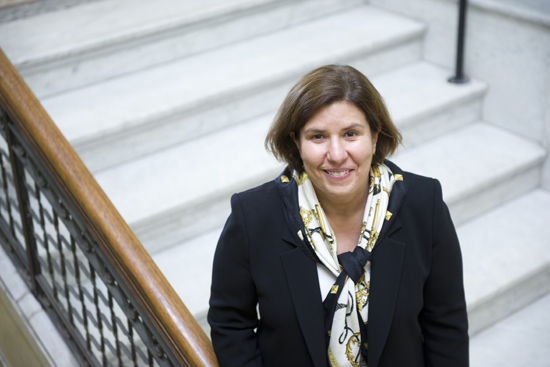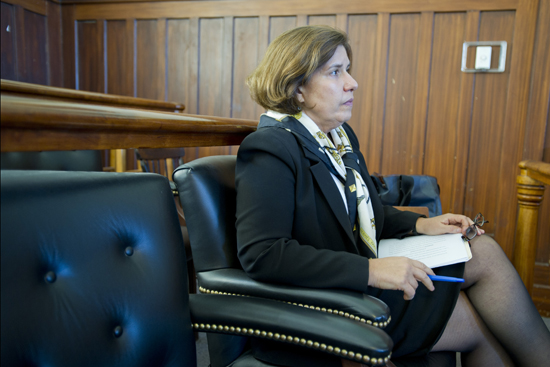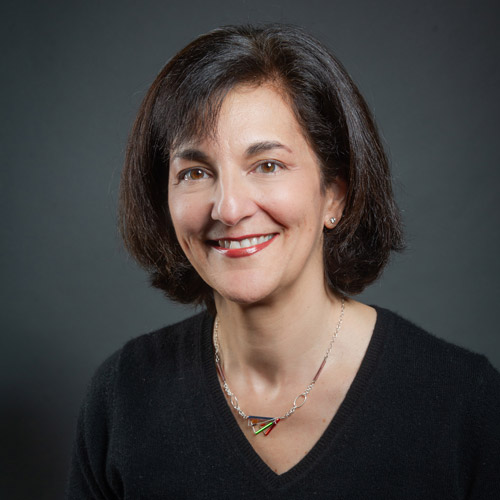Change of Venue
From Boston prosecutor to Law & Order, and back

Pamela Wechsler (LAW’88) was a prosecutor for 15 years before chucking her law career to move to Hollywood, where she wrote for the Law & Order series, among other legal dramas. Photo by Cydney Scott
In the 2009 Law & Order: Criminal Intent episode “Identity Crisis,” Gray Vanderhoven is enjoying the high life, living in a sumptuous Fifth Avenue apartment and attending black-tie events. But Vanderhoven is a poseur who has duped his wife into believing that he’s a Princeton graduate and a successful businessman of noble descent. The sham is revealed when his estranged brother turns up dead, and police track down Vanderhoven, the killer, in a stately Nantucket rental.
If the plot sounds familiar, that’s because a similar case had played out in real life just a year before. Christian Karl Gerhartsreiter, also known as Clark Rockefeller, had convinced his wife that he was a Yale graduate and a member of the wealthy Rockefeller clan. His ruse was exposed in 2008, when he kidnapped his young daughter on a Boston street during a supervised visit, and police caught up with him in a pricey Baltimore apartment.
The courtroom drama Law & Order, which ended a 20-year run in 2010, and its four spin-offs are known and loved for their ripped-from-the-headlines plots. When Gerhartsreiter’s case made national news, television writer Pamela Wechsler immediately recognized its appeal and based “Identity Crisis” on the story. Wechsler (LAW’88) was drawn less to the seedy details of Gerhartsreiter’s crimes than to “the idea of living a double life,” she says, “and that he was so successful. And the converse—turning a blind eye to clues that are there.
“And my brother went to Princeton,” she adds, “so I stole a lot from that.”
Wechsler was well suited to the job of writing for legal dramas. She was a prosecutor for 15 years before chucking her law career to move to Hollywood. She penned scripts for three of the Law & Order series and for the short-lived Conviction and Canterbury’s Law. Now, after seven years of spinning yarns about fictional villains, she’s back in the courtroom, arguing cases and putting away criminals for real as an assistant district attorney in the Middlesex district attorney’s office.
“It’s funny. It feels very natural,” Wechsler says. “And it also feels very foreign. I haven’t worked in Middlesex County before, and I haven’t been in a DA’s office since 1999.” But, she adds, “it’s like riding a bike. Sometimes you fall off…”

Wechsler began her law career—the first time—as an assistant district attorney in the Suffolk County DA’s office in the late 1980s, the height of the crack epidemic. Wechsler prosecuted hundreds of cases, involving homicides, sexual assaults, gang violence, domestic abuse, and other crimes.
After 10 years, she moved on to the Massachusetts attorney general’s office and then to the U.S. Department of Justice in Washington, D.C., where she prosecuted white-collar crimes. One of her cases frequently brought her to Los Angeles, where she fell in love with the casual lifestyle, the creative environment, and the weather.
At the same time, Wechsler had been advising a friend, a TV writer for the legal drama The Practice. “I started going out to Los Angeles on my own vacation time, visiting the set, and helping write scripts,” she says. “It was a world I didn’t know existed.”
She began reading scripts and watching hours of Law & Order and eventually wrote an episode of the show. The story was loosely based on a case she had handled in the Suffolk County DA’s office involving a Massachusetts Institute of Technology freshman who drank himself to death in a 1997 fraternity hazing. She landed an agent, and over the next couple of years checked in with him regularly. And she waited.
Dressed like Dr. Seuss characters
In 2004, her agent had good news. Writers and a producer were about to start working on a new Law & Order show called Trial by Jury. Could she be on the Universal Studios lot at 4 p.m. that day? Wechsler happened to be in Los Angeles at the time. “I went from the grand jury to Universal Studios in the black suit with the briefcase, looking so out of place, with people driving around in golf carts dressed like Dr. Seuss characters.”
At the end of the meeting, she was asked to stay. She gave her notice and two weeks later moved to L.A. to become a technical advisor on the new show. “Everyone thought I was crazy,” she says.
Wechsler saw it another way: an opportunity not to be missed, even though it meant taking a risk. At 42, she was giving up an interesting job with a steady income, and, she admits, she had no idea what she was in for. “I figured, Law & Order, there are so many of them, I’ll never be unemployed,” Wechsler recalls. “I didn’t realize that they’re all separate entities, and that if one didn’t work, you have to find a new job. It’s not like working for the government, where you can go from one court to the next. You’re sort of a writer for hire.”
“Prosecution is a much more sobering experience. What we do has an immediate and direct impact on the people involved. It may sound corny, but the rewards are in our contributions to the community and the victims we serve.”
Wechsler had a reason to believe that things would work out. “Prosecutors are natural storytellers,” she says. “You have to base your story on the facts and the evidence, but you’re putting together a story, from beginning to end, in a way that people can follow and are interested in and can understand. So, in that sense, it wasn’t a big leap.”
Her brother says the move didn’t exactly come out of the blue. She’d worked hard to learn how to write for television and was determined to pursue it, says Peter Wechsler, a lawyer in the U.S. Department of Justice’s civil division. “She is open to new experiences,” he says, “and has always been good at adapting to change.”
She also lacks an outsized ego, which made it easier for her to get along well with “a cast of characters,” he says, “some quite nice and some less so.”
On Trial by Jury, which starred Bebe Neuwirth, Wechsler helped the writers “break” their stories—write the scene-by-scene descriptions necessary to get approval to move to the script stage. She introduced them to prosecutors in the DA’s office in Manhattan, where the show was filmed, visited courtrooms with them, and met with judges. She also read scripts for accuracy and believability.
The first script Wechsler wrote for the show was inspired by a sensational true story that unfolded in Massachusetts in 1997: the case of British au pair Louise Woodward, convicted of shaking an eight-month-old boy to death. Woodward was found guilty of second-degree murder, but was later freed after the judge reduced the charge to involuntary manslaughter and sentenced her to time served.
In Wechsler’s version, titled “Baby Boom,” a young nanny is convicted of second-degree murder in a shaken-baby case, but the judge, finding no evidence that the case was proved beyond a reasonable doubt, vacates the verdict.
Wechsler says that writers may base Law & Order plots on newspaper headlines, but they can’t steal someone’s life story. “So, the nanny is from Pennsylvania and wants to be a handbag designer,” she says of the episode, which aired in 2005. “And the baby’s a girl instead of a boy, and there’s a single mother.” Every script undergoes scrutiny from a gauntlet of consultants—police, judges—and the show’s legal department, which vets every name that appears in the episode.
Still, sometimes legal dramas get things wrong. It may be as simple as the defense making opening arguments before the prosecution, says Wechsler, who notes that writers didn’t always take her advice. “As I was told early on at Law & Order, this is not a documentary,” she says. “This is entertainment. The question is, is it possible that this could happen, not, has anyone experienced it themselves. A lot of lawyers will say, ‘I’ve never seen that.’ But it doesn’t mean it couldn’t happen.”

Veteran writer and producer Rick Eid, who met Wechsler while working on Trial by Jury, says she was fun to work with, a quick study who brought an insider’s knowledge to the show. “She’s smart,” says Eid. “She made the people she was working with better at what they were doing.”
Wechsler loved the job. “The experience was fantastic,” she says. “It was a great group of writers.”
Then, after 13 episodes, the show was canceled.
“I was thinking, what have I done,” Wechsler says. “And, thank God I didn’t buy a fancy house.”
Wechsler pushed on, working on a full season of the Law & Order flagship series—the “mother ship”— as a legal consultant. Next, she joined the new show Conviction, about young DAs in Manhattan, as a writer and a technical advisor, and later Canterbury’s Law, which starred Julianna Margulies. Both were canceled after one season.
Eid, who had already been in the business for several years when he befriended Wechsler, knew the drill. “It’s not a business with a lot of stability,” he says. Besides the ever-looming threat of cancellation, there’s the periodic shrinking of staffs and budgets and, in a city with essentially one industry, some intense competition. “For every show that gets picked up, there are 5,000 writers trying to get one of those four jobs,” Eid says. “Unless you truly love writing, it’s a hard way to make a living.”
People who lead double lives
At one point, Wechsler began thinking about returning to her old job, and even interviewed at law firms. “Everyone made fun of me,” she says. “All of the writers said, ‘This is the life of a writer; get over it. You can’t always have an eye toward the door or you’re not going to succeed.’” She was fortunate that veteran producer Walon Green kept hiring her at the shows he worked on.
Finally, she returned to Law & Order for a season of the police procedural Criminal Intent. Over the years she had worked her way up, from technical consultant to staff writer to story editor. Now, in 2009, she was executive story editor.
Wechsler says she spent a lot of time reading newspapers, looking for ideas or an interesting character, and trolling her own experiences, “not necessarily for a whole script, but for a moment here, a piece of dialogue there.
“This is entertainment. The question is, is it possible that this could happen, not, has anyone experienced it themselves. A lot of lawyers will say, ‘I’ve never seen that.’ But it doesn’t mean it couldn’t happen.”
“As a prosecutor, I was always fascinated by the idea of people who lead double lives: a teacher who sold drugs, a doctor who trafficked in child porn. As a writer, I drew on extreme examples of people whose inner lives don’t match the lives they project: a con man who posed as royalty or a star athlete who raped a groupie.”
The challenge was to add her own twist. The Criminal Intent episode based on Gerhartsreiter “was about a man who wasn’t who he purported to be. We started with that premise and developed it into an episode about a psychologically damaged man who was desperate to erase his past.”
Peter Wechsler recalls feeling a twinge of envy when he visited his sister in L.A. “I remember one time we went to a small local restaurant, where we were seated next to a dozen celebrities at adjacent tables,” he says. “Everywhere you looked, there was a movie or a television star, a talk show host or a comedian. And the weather out there is fabulous year-round.”
Wechsler says it was like a dream, at least for the first couple of years. “You’re living in this beautiful apartment in Los Angeles, and it’s sunny every day, and you’re in this creative environment with new people who have a whole different outlook on life,” she says. “And I’m the expert. There were a lot of lawyers, but none I worked with had any courtroom experience or any prosecutorial experience.”
But while Wechsler has fond memories of writing poolside, she recalls plenty of days when the pace was frenetic. She and her colleagues were often rewriting scripts the entire time episodes were being shot. That happens for many reasons: an actress drops out, locations don’t work, scenes are too long or too short. And sometimes, actors don’t like their lines. “Some people can be pretty harsh,” Wechsler says. “You’re sitting in read-through, and an actor yells, ‘All I want is a good script. Is that too much to ask? One good script.’”
In 2011, Wechsler packed up again when her mother, Joan Wechsler (DGE’50, SED’51), became ill. She called friend and former colleague Gerry Leone, Middlesex district attorney, and moved back to Massachusetts in June in time to be with her mother when she died. She started her new job in July.
At Lowell Superior Court one day last fall, Wechsler—in a black suit once more, brown hair tucked neatly behind her ears—was juggling three cases. One man was arraigned on charges of assault with intent to murder and assault and battery with a dangerous weapon causing serious bodily injury, in connection with a stabbing. Another defendant, in a domestic violence case, was requesting the terms of his recognizance be changed so he could attend GED classes. A third case, involving three armed robberies, was rescheduled. They might not be the stuff of TV dramas, but they’re definitely fodder for hard days and late nights.
Not that Wechsler compares the two jobs. For one thing, the stakes are very different. “Prosecution is a much more sobering experience,” she says. “What we do has an immediate and direct impact on the people involved. It may sound corny, but the rewards are in our contributions to the community and the victims we serve.” Leone, now her boss, describes Wechsler as a hard-working, intelligent, and focused prosecuting trial attorney. He wasn’t surprised that she wanted to return to the work. “She always had a passion for it,” he says.
Wechsler doesn’t know if she’ll go back to Hollywood. “I never had a 10-year plan,” she says. And she has no interest in mining her current caseload for plot ideas. “I’m not looking at cases,” she says. “Because then you’re not in your case.” Her new job doesn’t leave much time for television, though she is a fan of Homeland.
But that doesn’t mean she’s closed the book on TV writing for good. “I might look at characters and think, that would be interesting.” And chances are good that it would be.
This article was originally published in the winter-spring 2012 edition of Bostonia.

Comments & Discussion
Boston University moderates comments to facilitate an informed, substantive, civil conversation. Abusive, profane, self-promotional, misleading, incoherent or off-topic comments will be rejected. Moderators are staffed during regular business hours (EST) and can only accept comments written in English. Statistics or facts must include a citation or a link to the citation.